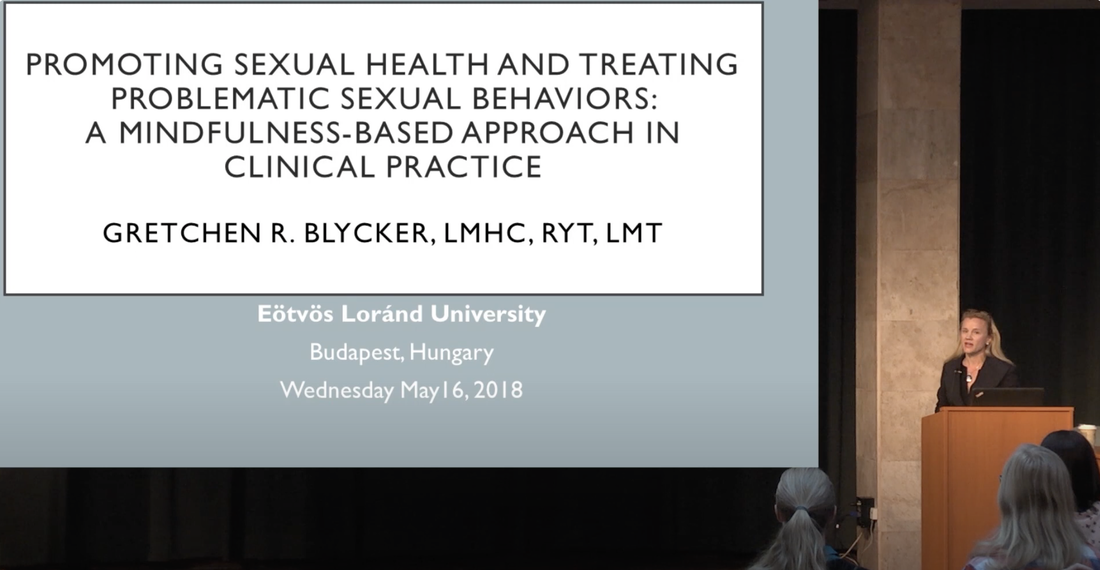The intuitive mind is a sacred gift and the rational mind is a faithful servant.
We have created a society that honors the servant and has forgotten the gift."
Albert Einstein
Aspects of Diversity: Identifying Symptoms of CSBD/PPU in a Romantic Relational System
Gretchen Blycker LMHC, LMT, CYT is a board-certified sex therapist and a sexual wellness educator at the University of Rhode Island. Her clinical work focusing on promoting sexual wellbeing, treating sexual trauma and compulsive sexual behaviors and addressing their relational impact informs her academic work and perspectives.
Background: Symptoms and consequences of Compulsive Sexual Behavior Disorder (CSBD) or Problematic Pornography Use (PPU) may first emerge in a relational context, therefore an increased understanding of interpersonal experiences and dynamics in a romantic relational system warrants further investigation. Addictions not only impact the person suffering with the disorder, but also significant others. However, when the addiction involves the integral nature of sexuality there are significantly different and unique consequences that sets this dynamic apart from being intimate with a person with any other addiction or compulsive behavior.
Method: This presentation includes a review of research focusing on pornography use and compulsive sexual behaviors and the effects on romantic relationships, including sexual and relationship satisfaction. Sociocultural influences which may contribute to the normalization of experiencing symptoms of CSBD/PPU in romantic relationships will be elucidated by research findings, as well as through clinical case examples.
Results: Impersonal approaches to sex, devaluation of intimate sex and communication, a gendered pleasure and orgasm gap, empathy reduction, power and control dynamics, expectations for a partner’s sexual compliance or avoidance of partner sex, and the blaming of the non-CSBD/PPU partner for sexual and relational problems are among the many symptoms identified in relational dynamics occurring with a partner with CSBD/PPU.
Conclusions: More research is needed to explore the interaction effects between the addiction enabling phenomena of denial and dishonesty operating with the CSBD/PPU partner and relational dynamics. Future research assessing for CSBD/PPU may benefit by including collateral information regarding the relationship or partner’s experiences. Interventions that are informed by CSBD, promote sexual health, integrate skillful interoceptive attunement and healthy emotional regulation, such as Compassion-Based Resilience Training, for sexual wellbeing are beneficial.
Click the video below to view this presentation.
Gretchen Blycker LMHC, LMT, CYT is a board-certified sex therapist and a sexual wellness educator at the University of Rhode Island. Her clinical work focusing on promoting sexual wellbeing, treating sexual trauma and compulsive sexual behaviors and addressing their relational impact informs her academic work and perspectives.
Background: Symptoms and consequences of Compulsive Sexual Behavior Disorder (CSBD) or Problematic Pornography Use (PPU) may first emerge in a relational context, therefore an increased understanding of interpersonal experiences and dynamics in a romantic relational system warrants further investigation. Addictions not only impact the person suffering with the disorder, but also significant others. However, when the addiction involves the integral nature of sexuality there are significantly different and unique consequences that sets this dynamic apart from being intimate with a person with any other addiction or compulsive behavior.
Method: This presentation includes a review of research focusing on pornography use and compulsive sexual behaviors and the effects on romantic relationships, including sexual and relationship satisfaction. Sociocultural influences which may contribute to the normalization of experiencing symptoms of CSBD/PPU in romantic relationships will be elucidated by research findings, as well as through clinical case examples.
Results: Impersonal approaches to sex, devaluation of intimate sex and communication, a gendered pleasure and orgasm gap, empathy reduction, power and control dynamics, expectations for a partner’s sexual compliance or avoidance of partner sex, and the blaming of the non-CSBD/PPU partner for sexual and relational problems are among the many symptoms identified in relational dynamics occurring with a partner with CSBD/PPU.
Conclusions: More research is needed to explore the interaction effects between the addiction enabling phenomena of denial and dishonesty operating with the CSBD/PPU partner and relational dynamics. Future research assessing for CSBD/PPU may benefit by including collateral information regarding the relationship or partner’s experiences. Interventions that are informed by CSBD, promote sexual health, integrate skillful interoceptive attunement and healthy emotional regulation, such as Compassion-Based Resilience Training, for sexual wellbeing are beneficial.
Click the video below to view this presentation.
Treatment needs for Women Impacted by a Partner’s Compulsive Sexual Behavior Disorder CSBD/PPU
Gretchen Blycker LMHC, LMT, CYT is a board-certified sex therapist and a sexual wellness educator at the University of Rhode Island. Her clinical work focusing on promoting sexual wellbeing, treating sexual trauma and compulsive sexual behaviors and addressing their relational impact informs her academic work and perspectives.
Abstract
Background: Women in romantic relationship with a partner with CSBD or PPU are often affected in many ways before root causes of problems are identified or diagnosed. Women may experience challenges and unique harms, including trauma, due to the nature of an addiction or compulsivity operating in the sexual system of a romantic context where safety, trust, empathy, emotional intimacy, honoring of commitments, honesty, and sexual wellbeing are foundational to a healthy secure relationship.
Method: A review of research focusing on the impact on women as well as a review of conceptual models for treatment for women with partners with CSBD/PPU will be presented along with clinical case examples. A holistic model will be utilized to compare the seven domains that comprise sexual wellbeing and how each domain may be impacted for women with partners with CSBD/PPU.
Results: Women may be isolated without proper support and a partner’s sexual compulsivity, upwards comparison to pornography, preferring pornography to partnered sex, or focusing craving towards partnered sex and therefore expressing dissatisfaction or resentment of sexual frequency may all possibly interfere with a woman’s sexual self-esteem and feelings about her body, sexual autonomy and agency. Clinical recommendations for supporting women will be included.
Conclusions: Education about the traumatic impact on women is essential for clinicians to provide a trauma informed approach to treatment. More is needed in the research and clinical fields to advance understanding and knowledge to inform evidence-based treatment needed by women impacted by their partner’s CSBD/PPU.
Click the video below to view this presentation.
Gretchen Blycker LMHC, LMT, CYT is a board-certified sex therapist and a sexual wellness educator at the University of Rhode Island. Her clinical work focusing on promoting sexual wellbeing, treating sexual trauma and compulsive sexual behaviors and addressing their relational impact informs her academic work and perspectives.
Abstract
Background: Women in romantic relationship with a partner with CSBD or PPU are often affected in many ways before root causes of problems are identified or diagnosed. Women may experience challenges and unique harms, including trauma, due to the nature of an addiction or compulsivity operating in the sexual system of a romantic context where safety, trust, empathy, emotional intimacy, honoring of commitments, honesty, and sexual wellbeing are foundational to a healthy secure relationship.
Method: A review of research focusing on the impact on women as well as a review of conceptual models for treatment for women with partners with CSBD/PPU will be presented along with clinical case examples. A holistic model will be utilized to compare the seven domains that comprise sexual wellbeing and how each domain may be impacted for women with partners with CSBD/PPU.
Results: Women may be isolated without proper support and a partner’s sexual compulsivity, upwards comparison to pornography, preferring pornography to partnered sex, or focusing craving towards partnered sex and therefore expressing dissatisfaction or resentment of sexual frequency may all possibly interfere with a woman’s sexual self-esteem and feelings about her body, sexual autonomy and agency. Clinical recommendations for supporting women will be included.
Conclusions: Education about the traumatic impact on women is essential for clinicians to provide a trauma informed approach to treatment. More is needed in the research and clinical fields to advance understanding and knowledge to inform evidence-based treatment needed by women impacted by their partner’s CSBD/PPU.
Click the video below to view this presentation.
Click the video below to view Gretchen's presentation,
“Cultivating Female Pleasure Through the
Bliss Body With Subtle Body Practices”
At the International Clitoris Summit, May 20, 2023.
“Cultivating Female Pleasure Through the
Bliss Body With Subtle Body Practices”
At the International Clitoris Summit, May 20, 2023.
Dive into the research and explore over 100 references with hyperlinks to full articles and abstracts of peer-reviewed literature investigating the complexities of sexuality.
The library below is organized into six categories; wellbeing, mindfulness, abuses of power, subtle body energy, sexual harm, and sexually explicit material.
The topics studied include; sexting, body image, social media use, emotional intelligence, sexual self-esteem, mindfulness, yoga, sexual functioning, sexual abuse, trauma, intimate partner violence, healing, objectification culture, mating strategies, pornography, sexual scripts, body autonomy, and sexual wellbeing.
The library below is organized into six categories; wellbeing, mindfulness, abuses of power, subtle body energy, sexual harm, and sexually explicit material.
The topics studied include; sexting, body image, social media use, emotional intelligence, sexual self-esteem, mindfulness, yoga, sexual functioning, sexual abuse, trauma, intimate partner violence, healing, objectification culture, mating strategies, pornography, sexual scripts, body autonomy, and sexual wellbeing.



